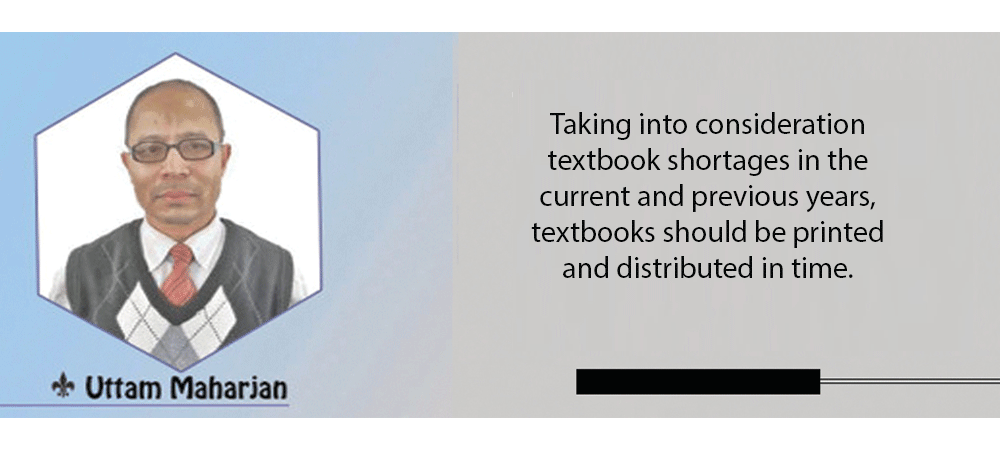- Thursday, 19 February 2026
Tackle Textbook Shortage Effectively
Education is the key to development. That is why many countries around the world prioritise education by allocating a sufficient budget. In Nepal also, a budget is allocated for education every year. However, the government does not seem to be paying heed to the development of the education sector. There are anomalies in the education section such as shortages of textbooks. This problem has been perennial; during this academic session, too, the problem is still there. There are complaints from outlying areas about the unavailability of textbooks nine months into the current academic year. The academic year began in Baisakh.
Shortages of textbooks on a perennial basis show the apathy of the government towards the education sector. Not all textbooks are published by the same printing press. This year, the government-owned Janak Education Material Centre (JNMC) has printed textbooks for grades four to ten, while private printing presses have been assigned the task of printing textbooks for grades one to three. These printing presses have failed to print books in adequate quantities and in time. The government has claimed that this is due to the elections to local bodies in May 2022 and to federal and provincial governments in November 2022 and that the Russia-Ukraine war has made the availability of paper scarce and jacked up the prices. There may be some truth in it but the shortages of textbooks were felt even last year.
Bad impact
Shortages of textbooks may have a bad impact on not only students but also schools and teachers. In schools where textbooks are not available, students have to depend on teachers’ lecture and the notes they jot down. They find it heavy going to do homework. They may lose interest in studying. As such, they may skip classes. Worse, they may even drop out of school. On the other hand, teachers may find it difficult to achieve education goals. They may even find it difficult to assign homework to their students and check their answer sheets. They may be in a dilemma as to whether to get their students through or pluck them in examinations because the students cannot study properly for lack of textbooks. Students appearing in SEE examinations are badly hit as they are the students preparing for higher studies.
Just printing textbooks in adequate numbers is not the solution. Timely distribution is equally important. Textbooks are distributed to schools through local dealers. Problems with distribution are also encountered frequently. Moreover, the government has a policy of distributing new textbooks to schools every year. Old textbooks can be used up to three academic sessions as per studies. If a policy of using old textbooks is adopted, the government can print only the textbooks that are not sufficient.
This will save the government a huge cost. Raw materials for printing textbooks – paper and ink, for example- have to be imported from abroad. There are also transport costs involved in distribution. However, textbooks should be designed in a such way that they serve as reading materials only with no spaces in them for exercises.
As textbooks are distributed to students free of cost, they may not care about them. So students may be encouraged to care about their textbooks by providing them with some cash incentives, which can be used for buying exercise books, pens, erasers and other stationery, depending on the condition of their textbooks. Such incentives will help students to keep their textbooks in good condition. Textbooks used by government and private schools may not be the same.
The government should adopt a policy of maintaining uniformity of textbooks in both government and private schools alike. This will help in maintaining the same standard of education in both government and private schools. This is important from both academic and social points of view.
It is deploring to note that the government has not passed the Federal Education Act yet. The federal constitution was proclaimed in 2015. So the proclamation of the act and some education-related bills has been overdue. The act and relevant laws will guide the officials concerned on how to deal with anomalies, including shortages of textbooks, seen in the education sector. It is an irony that although the country is under a federal setup, adjustment, restructuring and transformation in the education sector are yet to take place.
Teaching activities
Shishir Khanal has recently assumed the mantle of the Ministry of Education, Science and Technology. He has vowed to get the Federal Education Act and University Umbrella Act endorsed in Parliament and try his best to solve the anomalies seen in the education sector. He has said that his focus will be on the adjustment of teachers’ quota for schools, timely management of textbooks, implementation of post-COVID learning and teaching activities for further development of the education sector and policy-level arrangements for quality improvement in the education sector.
The next academic session begins in Baisakh 2080. Taking into consideration textbook shortages in the current and previous years, textbooks should be printed and distributed in time. A strategy of printing and distributing textbooks in a cost-effective manner should also be developed. Likewise, a policy of re-using the same textbooks for two or three sessions should be in place. The Ministry of Education should pay attention to improving the education sector by eliminating textbook shortages and other aberrations. Education is directly related to the future of students. Let’s hope that textbook and other problems will not repeat themselves in the upcoming session.
(Maharjan has been regularly writing on contemporary issues for this daily since 2000. uttam.maharjan1964@gmail.com)
















